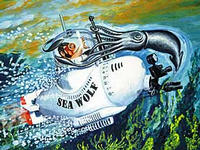| Go Deep | 2003-04-24 17:46 4 comments |
 by Flemming Funch by Flemming FunchWired has an editorial by Graham S. Hawkes suggesting a NASA for the exploration of the deep oceans. It has been noted many times that our oceans contain more mysteries and are more uncharted than is the Moon or Mars. And they're so much closer. About 94 percent of life on Earth resides in the oceans. We've seen only about 2 percent of this vast ecosystem - the uppermost layer (home to fish, whales, scuba divers, and most known marine life). Beneath this warm lens lies a cold, dark, and life-rich realm of grand proportions. It's home to creatures as far removed from the sun and human biology as any alien imagined by science fiction.There's potentially huge resources there, and discoveries waiting to be made in how life works, in new kinds of DNA. Currently, the entire US scientific community shares a single, 12-year-old submersible named Alvin. With just one Alvin, long-range exploration is nearly impossible. Alvin doesn't even know where to go because we don't have a decent map. The latest ocean charts rely on satellites to detect the sea-level changes wrought by the gravitational pull of underlying topography. This gives us a crude sketch that's essentially useless without hands-on exploration. We can't begin to mine the sea's minerals or harvest DNA unless we go deep, with a fleet of sea exploration vessels. We need a national agency with the stated goal of exploring, mapping, and studying the oceans.Well, maybe it isn't all that terrible that the U.S. hasn't figured out how to exploit the resources of the oceans. That keeps them somewhat intact. Or just accessible to nations that are more concerned about the environment than the U.S. regime. |